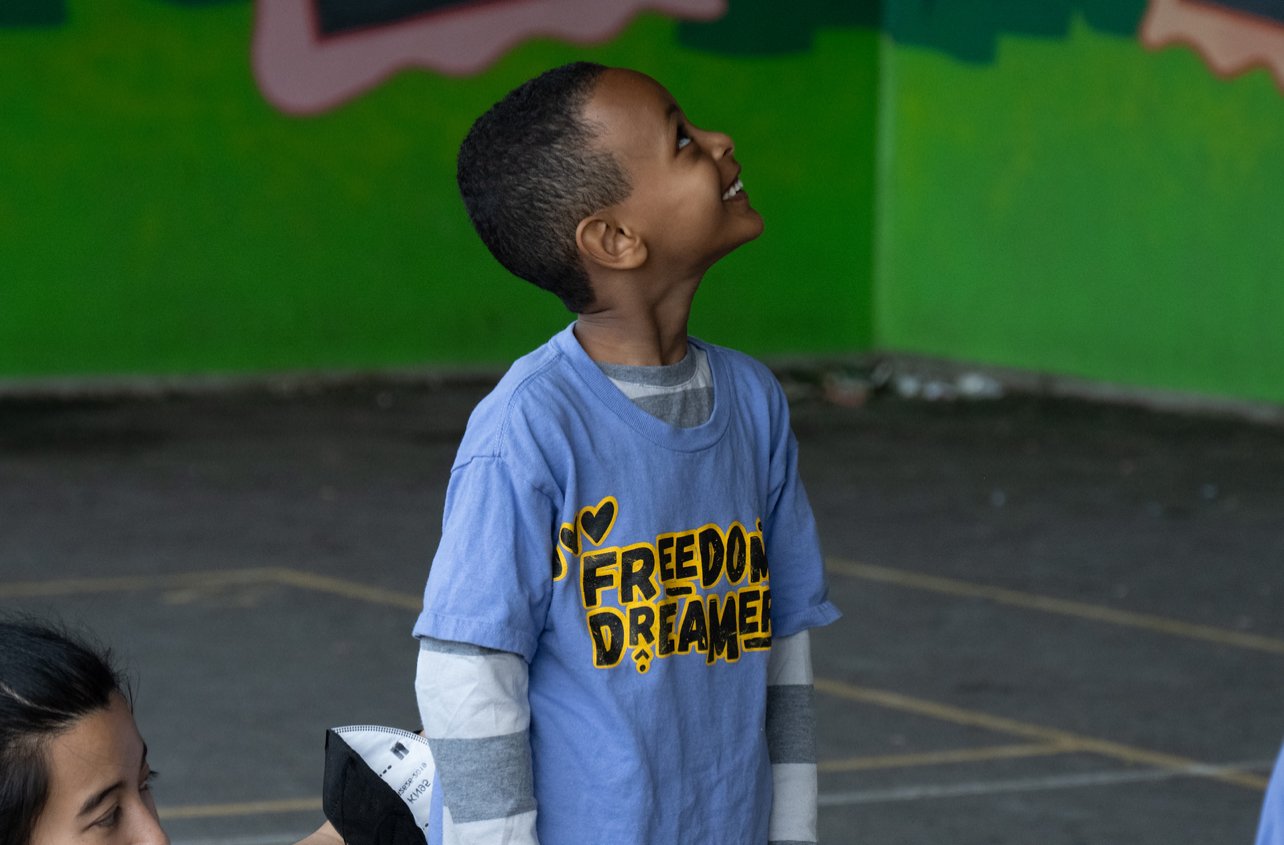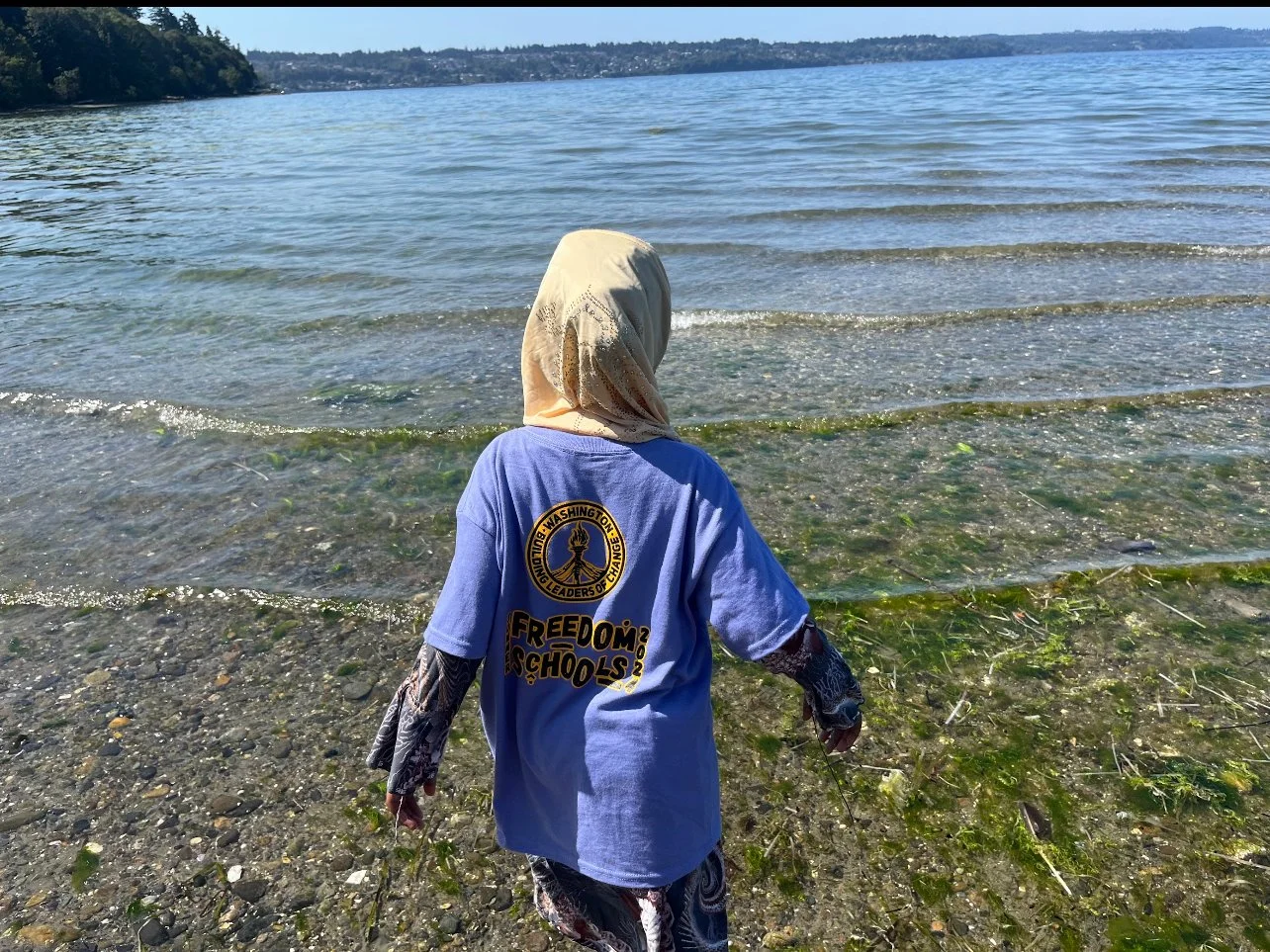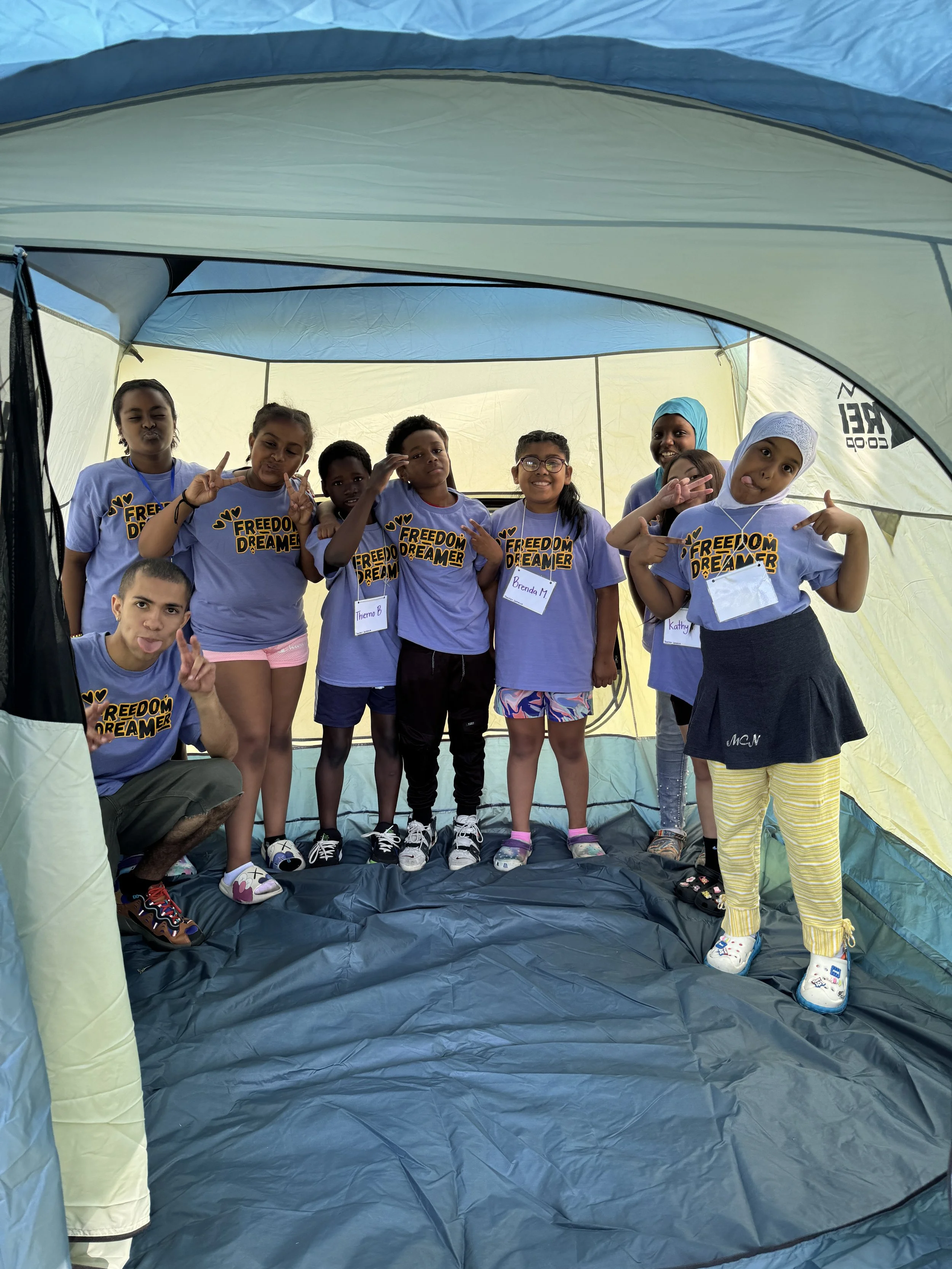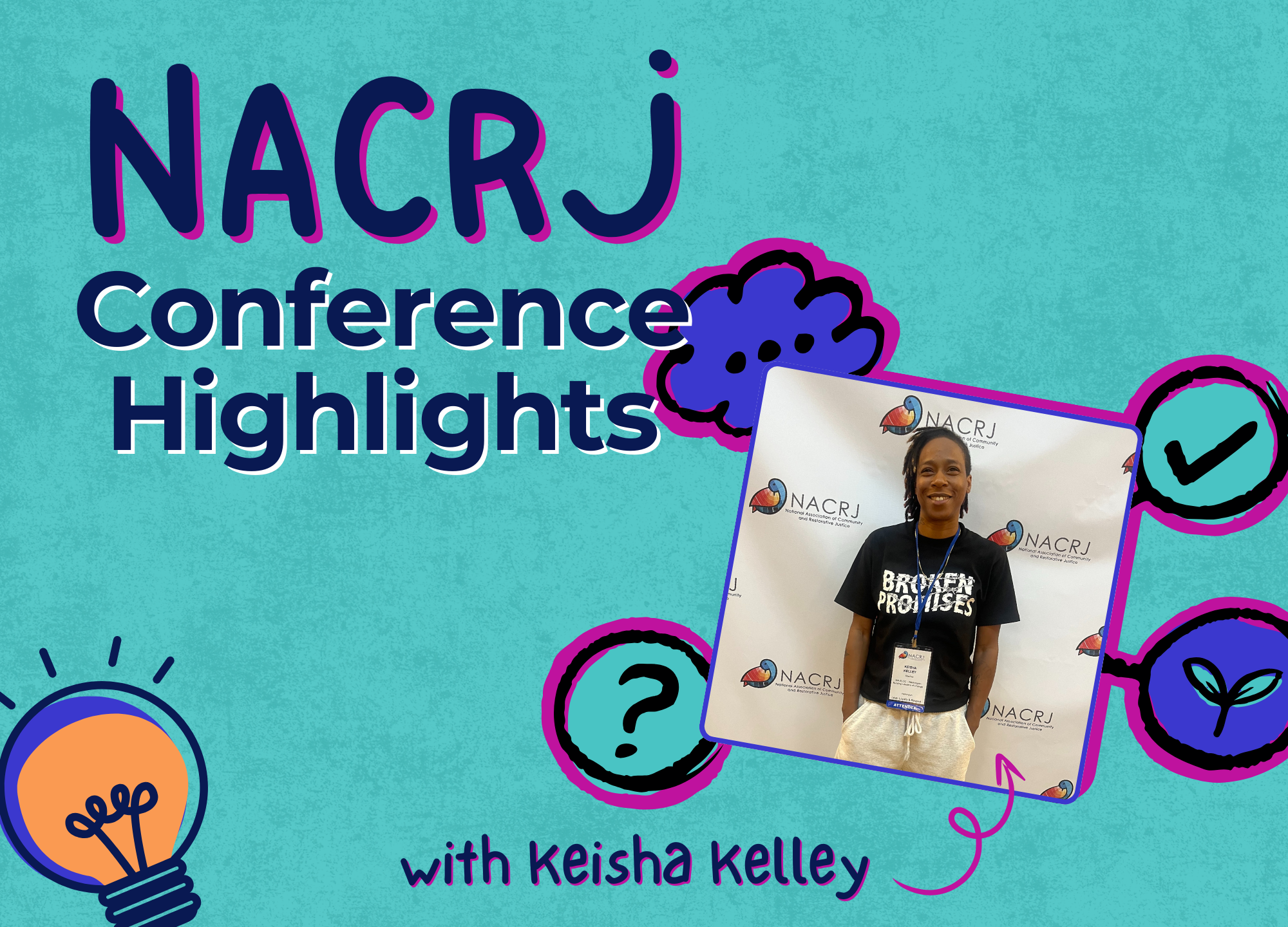August Newsletter: Black August and our Freedom Dreams
Greetings, community!
“Ella Baker was a Freedom Fighter who taught us how to fight. We gon fight all day and night until we get it right. Which side are you on my people, which side are you on (I’m on the Freedom side!) Which side are you on my people, which side are you on (I’m on the Freedom side!)...Salome is a Freedom fighter who taught us how to fight…”
The beautiful voices of 50 children rang out in the streets of south Seattle around Emerson Elementary as WA-BLOC Freedom Schools scholars took to their neighborhood streets leading a march and rally to raise awareness about gun violence, homelessness, and pollution in early August. They raised fists and posters and their voices. They sang, and chanted, and shared speeches with one another about their Freedom Dreams and the changes they want to see in their community.
In the fierce spirit of our Freedom Schools scholars and Black August, a dedicated month to commemorate Black resistance, freedom struggles, and political prisoners, we offer you our current reflections and Freedom Dreams from this past month and the people, actions, and joy worth fighting for. In this newsletter you’ll find:
The Fight for Student Mental Health Supports
Seattle Times Feature: WA Freedom Schools program connects students to civil rights legacy
Freedom Schools Wrapped!
National Association for Restorative Justice (NARCJ) Conference Reflections
Joy Manual: Digital Booklet of Community Building Games and Circle Outlines for Schools and Educators
Community Resources and Events
Last year, the City of Seattle worked with students and approved $20 million per year to fund mental health services in Seattle’s schools. However, a budget proposal by the mayor cut that funding in half to just $10 million this year and last week the Seattle City Council voted not once- but twice - to reject legislation that would stop the Seattle City Council from cutting $10 million in funding for student mental health.
As educators and restorative justice practitioners partnering directly with schools for nearly a decade, we have seen an increase in the need for youth mental health services in the past decade, and especially since the Covid-19 pandemic that disproportionately affected our communities in southeast Seattle. Our youth need safe places, supportive adults, meaningful opportunities to thrive, and access to qualified mental health professionals inside and outside of schools. We cannot ask our schools to both provide quality education and a social safety net for our children, when they are not funded to do so.
WA-BLOC wants to thank our community and partners for signing on and sharing the letter calling on Seattle City Council to honor their commitment and fund youth mental health supports. Another big thanks if you took the time to make a public comment. Although the City Council's final vote was disappointing, your commitment to advocating for student wellness is truly appreciated and supported and contributed to an additional 2.5 million approved towards student supports (combined with an additional 2.3 million from Seattle Public School District brining total to 14.5 million). We commend Councilmembers Morales, Hollingsworth, Saka and Woo for voting to maintain full funding for youth mental health, and will continue to urge their colleagues to show their respect for our young people and join them.
📣Call to Action 📣
Continue to email and/or meet with your City Councilmembers and ask them to restore the full $20M for student mental health supports. Fellow community partner SESEC has prepared a template letter and here is a link to find your district representative.
Read Big 5 Legislative Priorities to Fully Fund Our Schools and sign pledge!
More articles about this issue:
OPINION | When Will We Fully Fund Student Mental Health Services and Restorative Justice Practices?
Funds for Student Safety Foreshadow Fierce Debate on Seattle Budget
Letter to the Editor: Student safety: Fund mental health alternatives
Call on Seattle City Council to Reject 50% cut to student mental health funding
Seattle Times Feature: WA-BLOC Freedom Schools
By Denisa R. Superville Seattle Times staff reporter
WA Freedom Schools program connects students to civil rights legacy
On a recent summer day in South Seattle, Mari Ramirez wrapped up reading “Homeland: My Father Dreams of Palestine,” a picture book by Hannah Moushabeck about a father’s recollections of his homeland.
Then Ramirez gave the second and third graders, who had been listening intently and asking questions, their next task: Use watercolors to illustrate a memory from their parents’ homeland or, if they were from Seattle, their favorite place in the city, and write a few sentences to describe it.
One drew an Eid celebration with friends and family in the city, with a Gambian flag in the top left-hand corner. Another painted verdant plants in a park in Colombia, where she spent time with her grandmother. With careful, deliberate strokes, another painted blue waves to recall a trip she’d taken to a waterpark in East Africa, which she visited when she was 7.
Ramirez’s lesson was part of a week of activities at WA-BLOC’s Freedom Schools in Southeast Seattle this summer. The program at Emerson Elementary School is an incarnation of the historic education movement launched during the 1964 Mississippi Freedom Summer. The Student Nonviolent Coordinating Committee, the youth wing of the Civil Rights Movement, set up Freedom Schools to bridge gaps in what Black students were learning in their traditional public schools. In addition to math and literature, organizers also taught students about Black history and resistance.
Y’all the reviews are in and this summer’s iteration of Freedom Schools was everything! We could not have had such a successful run without the brilliant educators, support staff, financial and material donors, bus drivers, families, and scholars that make up our community. Thank you to every single person who helped us put together another year of programming for Rainier Beach youth.
Here are some highlights that we would like to share with you!
By The Numbers
Over the course of our five week program for 51 K-5th grade scholars, we spent an estimated 60 hours on critical literacy activities (analyzing, writing, questioning, wondering!), 40 hours on enrichment activities (biking, painting, cooking, engineering!), 600 minutes on independent reading (board books, comic books, chapter books, graphic novels!), and 540,000 seconds on building a joyful space for learning and community (games, laughter, music, friendship bracelets!).
And all of these minutes added up to encouraging gains in scholar academic skills! MAP test scores from the end of the academic year indicated that 85% of our scholars were below 70th percentile in reading, with the majority of those scores averaging in the 31st percentile. After participating in Freedom Schools for 5 weeks our scholars maintained or increased their reading levels–not a single one experienced summer learning loss. We performed Fountas and Pinnell comprehension assessments on the first and last weeks of the program: 100% of our scholars maintained their reading level, and over half (65%) of our students’ reading levels increased–35% by 1 level and another 30% by 2 levels.
Community Building is FUNdamental to Learning!
As many educators and school leaders are preparing to kick off the school year, we hope to support you in doing so with lots of joy and laughter! We are excited to introduce our new digital workbook designed to help K-12 educators infuse joy into their classrooms and curriculum just in time for the upcoming school year. Sourcing games from various students, educators, organizations, and websites, this workbook emphasizes the importance of Community Building. It offers a variety of student-approved games that foster strong relationships, team building, and collective problem-solving. K-12 students and adults alike will benefit from these fun challenges in their learning spaces.
This summer WA-BLOC compiled our go-to, youth-tested community building games and activities into a free, digital booklet. Following the district-wide Community of Practice sessions we hosted quarterly alongside other community partners, practitioners, and the SPS Restorative Practices team last year, we wanted to create a resource that allows our educator network to continue infusing lots of giggles into their community building and circle practice.
A big shout-out to Chelsea Gallegos and Manny Cadenas (Solutions by Cadenas) for leading many of the Community of Practice sessions over the past two years that have invited educators into silliness, using gameplay as an opening ceremony and within community-building circles to keep things fresh and engaging. Chelsea worked hard to compile the instructions for these games so they are accessible to educators who didn’t have a chance to join in on the fun live this past school year. Also included in the Joy Manual are helpful outlines for community building circles for all grade levels developed and facilitated in schools by our magical WA-BLOC team.
Please feel free to use and share the Joy Manual with other restorative educators and youth practitioners in your network. Of course, you’re welcome to adapt the games as needed to best fit your specific context and community.
This summer, WA BLOC had the wonderful opportunity to send one of their staff members to the largest Restorative Justice conference in the world. The National Association of Community and Restorative Justice is considered to be the world’s largest restorative justice gathering in the world, hosting 1,707 attendees at the 8th National conference back in 2022. I, Keisha Kelley, had an amazing honor of attending on my team's behalf this year and here are some of the highlights:
This year, the NACRJ’s team worked effortlessly on this conference, making it extremely accessible for all, with offerings ranging from yoga to conversations deep into politics. There was space designated for youth, as well as an entire floor designated for self-care. This floor had yoga offerings, mindfulness/guided breathing, arts and crafts, massage, quiet rooms, etc.
There were about 500 sessions to choose from and many authors and practitioners that we refer to in our WA-BLOC programming were at the conference. I took a session with the authors of the Little Book of Youth Engagement in Restorative Justice, which gave me a new perspective on intergenerational leadership.
The highlight of the conference for me was a session on “Building a Restorative School” by The Ron Brown School in Washington D.C. - an all-male public college preparatory high school with Restorative Practices as its foundation. It was so motivational and affirming to see similar models and strategies that are closely aligned to how we (WA-BLOC) engage whole school communities in order to build a truly restorative school. For me, this session was proof that building a truly Restorative School is a reality.
All in all, this experience was a once in a life-time experience and I am forever grateful to share!
Partner Events & Educational Resources
SESEC Advocacy and Policy Cohort Now Accepting Applications: Priority Deadline August 30th, 2024
Sweet Grief & Sweet Tea | A weekend of tea ceremony, cultural gifts pop up market, and grief medicine, by a Resting Place. Sept 7th & 8th, 2024,
First day, Free Tea | Drop in All Day
Second Day, Herbal Sweets workshop w/ Angela | Register HERE
When Mental Health, Family, & Culture Intersect | Sahaj Kohli with Ruchika T. Malhotra
Mon 9/23 at 7:30PM | $10-$35 + Optional Book Add-on |
The Wyncote NW Forum, 1119 8th Ave (Entrance off Seneca St.) Seattle, 98101 United States
